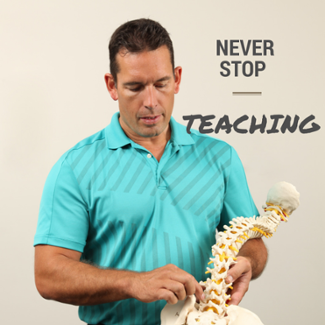I have often been asked if I would share the “secrets” for how I was able to build a successful family wellness cash practice that had a PVA well in excess of 100. Happy to share them so lets start with a biggee ……. NEVER STOP EDUCATING YOUR PRACTICE MEMBERS! 
I learned this lesson years ago with a practice member named Betty who had been under care for 14 years on a twice/monthly check up protocol. I figured after all those years Betty pretty much owned the principles of chiropractic at least as well as I did…….. or so I thought. One day she missed an appointment and didn’t call to reschedule so we were all worried. As our systems prescribed, one of our team members attempted to contact Betty 3 times within the first 24 hours and when she couldn’t we felt maybe something bad had happened. We all left for home worried about Betty.
I reached out the next day and was able to connect with her on the phone and she assured me she was fine. I was relieved and told her we were worried about her when we hadn’t heard from her and now that we knew she was alright did she want to rebook her appointment she missed. She became one of my greatest teachers with her next sentence. “No thanks Dr. Tom I love you and your team but I am done with chiropractic.” I sat speechless not fully comprehending what I was hearing. I made some feeble attempts to reposition things for her but after 14 years what else could I say. She cheerfully brushed me off, wished me a great day and hung the phone up. I promptly reviewed her file and realized I had failed Betty as I had not performed a proper progress exam in over 3 years. My bad but …… I was sure to learn from it.
MORAL OF THE STORY …. NEVER STOP EDUCATING YOUR PRACTICE MEMBERS!
Also see, what 20 years of chiropractic coaching has taught me
Which brings us back to this article today, the top 10 secrets to effective table talk.
COACH TOM’S TOP 10 TABLE TALK SECRETS
-
Never stop educating your practice members. Remember Betty and the care she didn’t get because I failed her.
-
Have a plan. Have a plan for how you are going to educate on the key aspects of your style and philosophy of practice. Don’t leave it to chance and risk getting busy, missing an educational opportunity. It may mean the difference between them staying, getting the full value of your care, and changing their life for the better… or not.
-
Build from one opportunity to the next. Make your education system build naturally from one educational opportunity to the next. Education should start on the intake phone call and continue at the intake visit. Key concepts and ideas are repeated and built on during the report of findings and the health care class. These are supplemented and added to during table talk and the progress reviews.
-
Repeat, repeat, repeat key concepts and ideas. Cognitive psychologists tell us that people must hear things 11 to 14 times before they start to develop ownership of them. This means key concepts and ideas need to be repeated in different ways at different times to help people own them.
-
Use stories, parables, metaphors and analogies. People can gap and lose focus in their conscious minds but their subconscious mind never rests. Since it learns and remembers things in stories, parables, metaphors and analogies it is important to use these when educating, and particularly during table talk.
-
Have a systemized approach to your table talk. Think through what the first 10 or 12 (whatever takes you to your first progress exam/review) key concepts are that you want to educate them on and in what order. Practice and role play these with your team and coach until you have at least 4 different ways to communicate the same concepts in slightly different ways. Once these 10 are mastered, pick your next 10 or 12 and so on for as many visits as you feel will serve your practice members best.
-
Have a trigger word to remind you. Boil each educational concept down to one trigger word that will remind you of the concept and write it in your travel card or put it into your paperless office SOAP notes software. Now you have no excuse to ever forget.
-
Reinforce the key concepts with an article, audio, video. Back up your short and sweet table talk educational opportunity with an article, audio or video to cement in the concept for those that want more data.
-
Have full team support. Ensure your team is just as aware as you are of the key table talk concepts and the order they are presented so they can reinforce them regularly at the front desk.
-
Have fun. Table talk education can and should be fun. I like the concept of“edutainment.” Education that is entertaining. This keeps people interested and ensures they retain the valuable information.
Education is the key to increasing the probability that your practice members will stay under care long enough to get the true long term benefits of a properly functioning nervous system. Table talk is one of the most important systems to integrate into your practice to manifest this, as it is the most ongoing and repeated of all the education systems. If you would like help brainstorming table talk ideas, click here for a list of 50 great ones.

